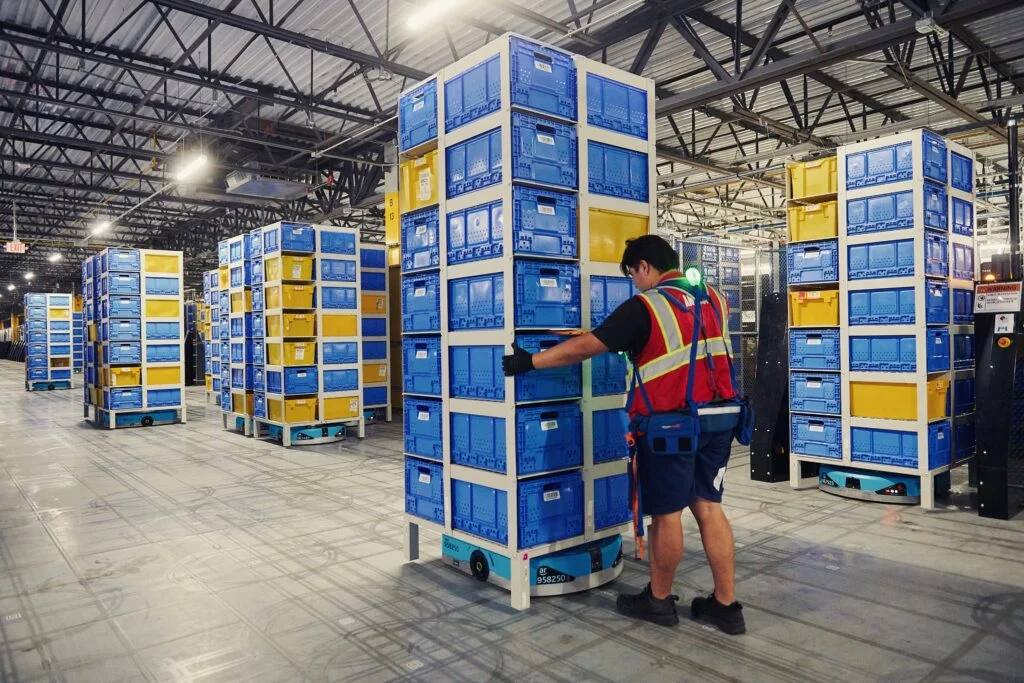Copyright Benzinga

Amazon.com Inc (NASDAQ:AMZN) celebrated a robotic milestone earlier this year while making sure to say the company was not replacing human workers. New documents show that Amazon could have new plans to replace the necessity to hire human workers thanks to its robotic progression. • AMZN stock is gaining positive traction. Get the inside scoop here. Robots Take Over Over the years, Amazon has utilized robots and technology advancements to make its warehouses more efficient and lower its operating costs to help lower costs for consumers and improve operating margins. With sights set on more improvements to efficiency and costs, Amazon could be looking to replace future workers with robots. Benzinga reached out to Amazon for comment and had not heard back at publication. Internal documents from Amazon, viewed by the New York Times, show the e-commerce giant could turn to robots instead of hiring 160,000 people it needs to maintain growth of current and future operations by 2027. By replacing the future human workers with robots, Amazon would save an estimated 30 cents per item purchased and delivered to customers, according to the documents. With a goal of selling twice as many products as it currently sells by 2033, Amazon would need to hire around 600,000 people. The company is hoping robot advancements mean it won't have to add to its existing workforce in the U.S., potentially replacing those 600,000 future jobs with robots. Some of Amazon's warehouses already have fewer and fewer humans being utilized thanks to robotic advancements. Amazon's ultimate goal is for 75% of its operations to be automated. A document from Amazon's robotics team said it was helping to "flatten Amazon's hiring curve over the next 10 years." The statement came after an advanced warehouse in Shreveport, Louisiana, showed that 25% to 50% fewer human workers were needed with more robots used from the beginning. That design is expected to be copied by 40 Amazon facilities by the end of 2027. The documents show Amazon may already be preparing for the potential fallout from job losses and a lack of future hiring by making greater efforts in community events to instill goodwill with communities that have warehouses. Amazon may also have executives stop using certain words and phrases such as "automation" and "AI" in the future, preferring instead to say "cobot" to imply robots are working in close collaboration with humans. In the New York Times, Amazon spokeswoman Kelly Nantel said the documents viewed were incomplete and not the full picture of the e-commerce giant's future hiring goals. Nantel said Amazon plans to hire 250,000 people for the 2025 holiday season, but declined to say if any of those holiday roles would be permanent. Amazon told the New York Times that it does not have any words or phrase requirements for executives and plans to advance community involvement is not related to job losses. Read Also: Amazon Q2 Earnings Highlights: Double Beat, ‘AI Progress Across The Board Continues’ Job Losses Could Have Big Impact A Nobel Prize winner told the New York Times the potential job losses from Amazon could have an effect on employers such as Walmart and UPS, which could choose to also advance automation efforts and cut human jobs. "Nobody else has the same incentive as Amazon to find the way to automate," Massachusetts Institute of Technology professor Daron Acemoglu said. "Once they work out how to do this profitably, it will spread to others, too." Acemoglu, who won the Nobel Prize in economic science in 2024, said Amazon could quickly go from best to among the worst in employment. "One of the biggest employers in the United States will become a net job destroyer, not a net job creator." Amazon is the second-largest employer in the U.S., hiring hundreds of thousands of workers nationwide in recent years. The company's workforce is around 1.2 million employees in the U.S., more than tripling since 2018. In July, Amazon said that it is offering training for employees to learn robotics management and offering career paths alongside its robotic advancements. Amazon acquired robotic company Kiva Systems in 2012 for $775 million. Kiva changed its name to Amazon Robotics in 2015 and has been a large focus of the e-commerce company's automation efforts since then. The acquisition could end up being one of the most important in Amazon's history as the e-commerce giant gets closer to having more robots employed than humans. Amazon Stock Price Action Amazon stock is up 2.682% to $222.58 on Tuesday versus a 52-week trading range of $161.43 to $242.52. Amazon stock is up 1.3% year-to-date in 2025. Read Next: Jeff Bezos Owned 43% Of Amazon At IPO — Now He’s Down To 9% Photo: Amazon employee with mobile robot, courtesy Amazon



